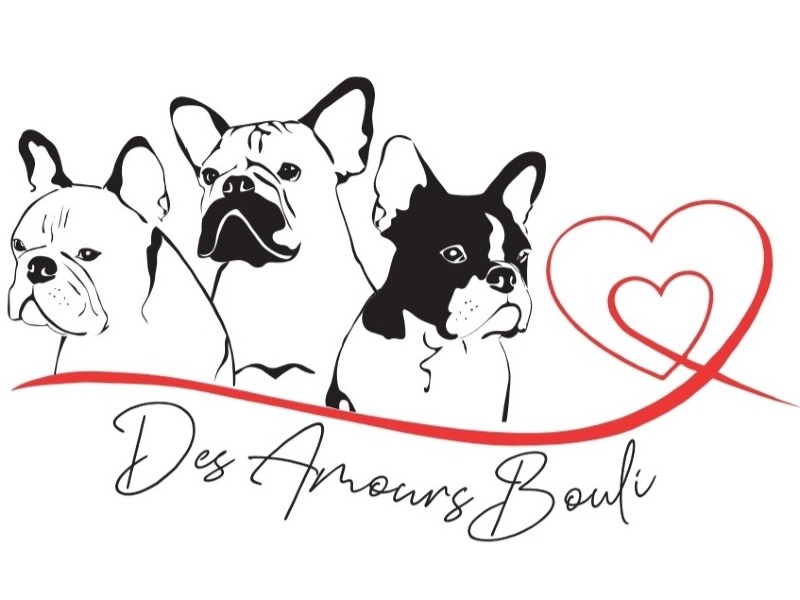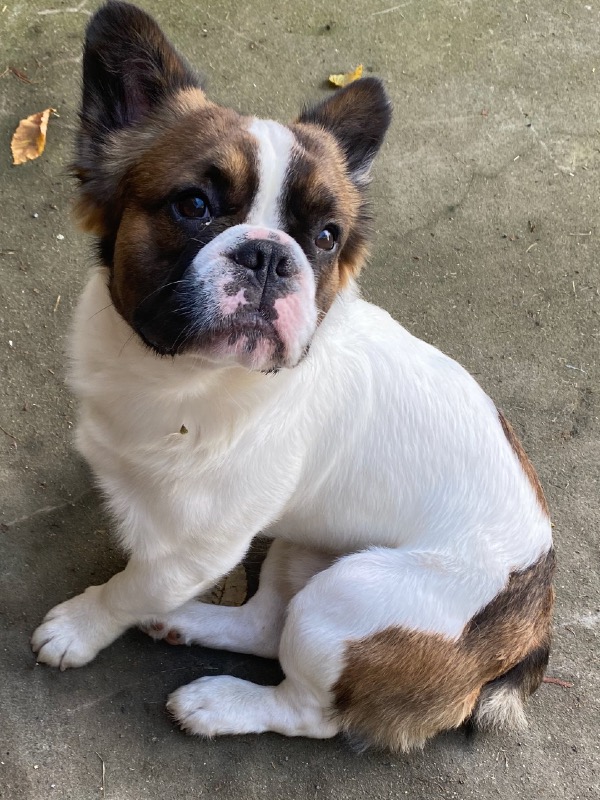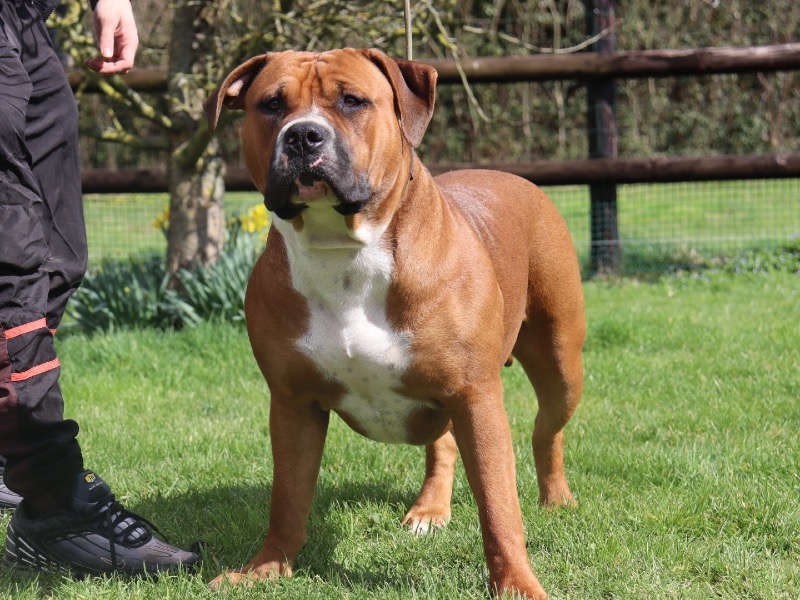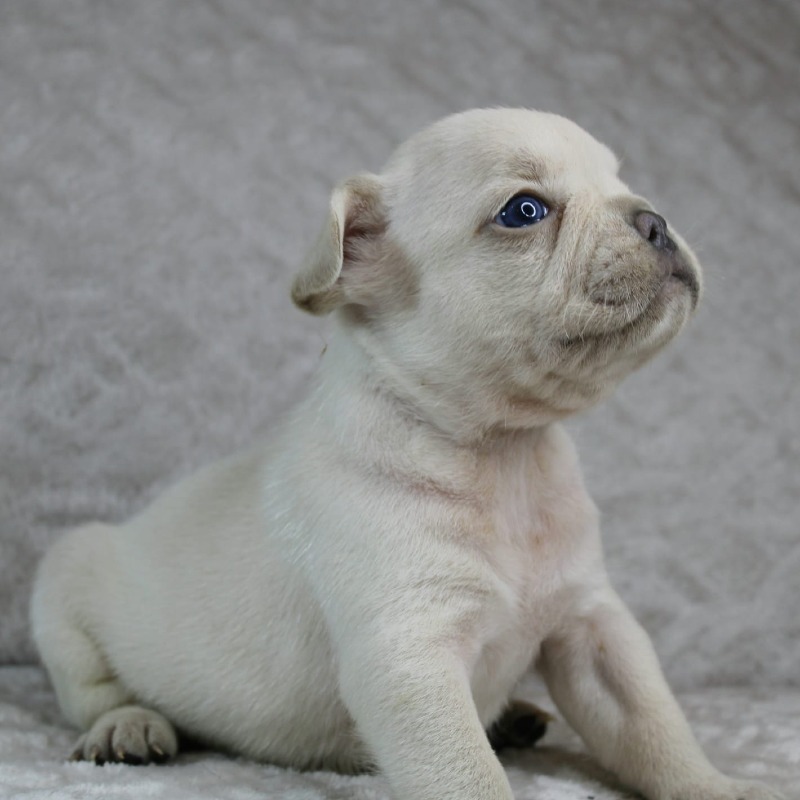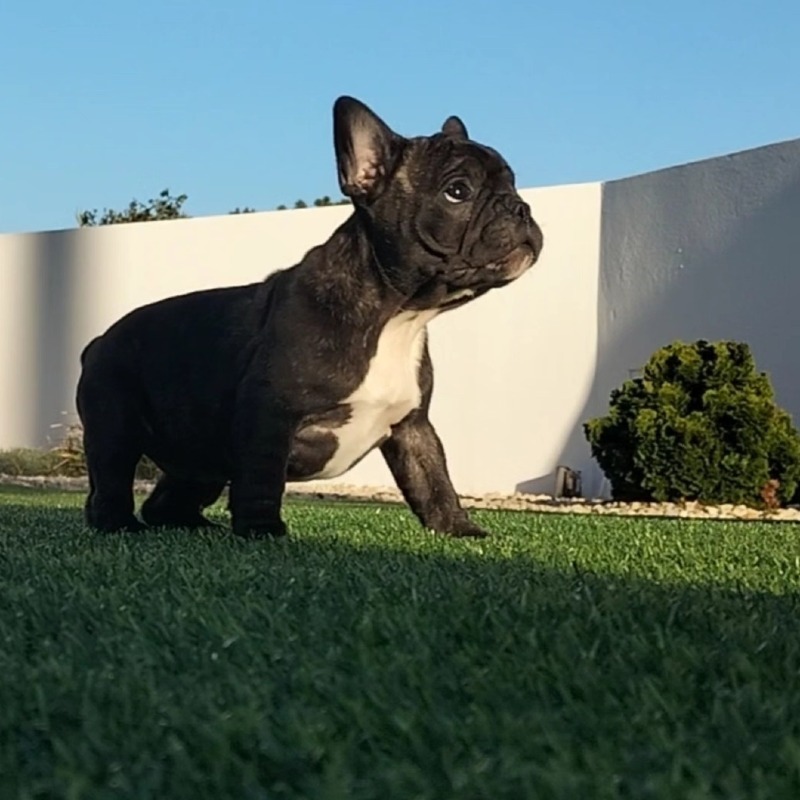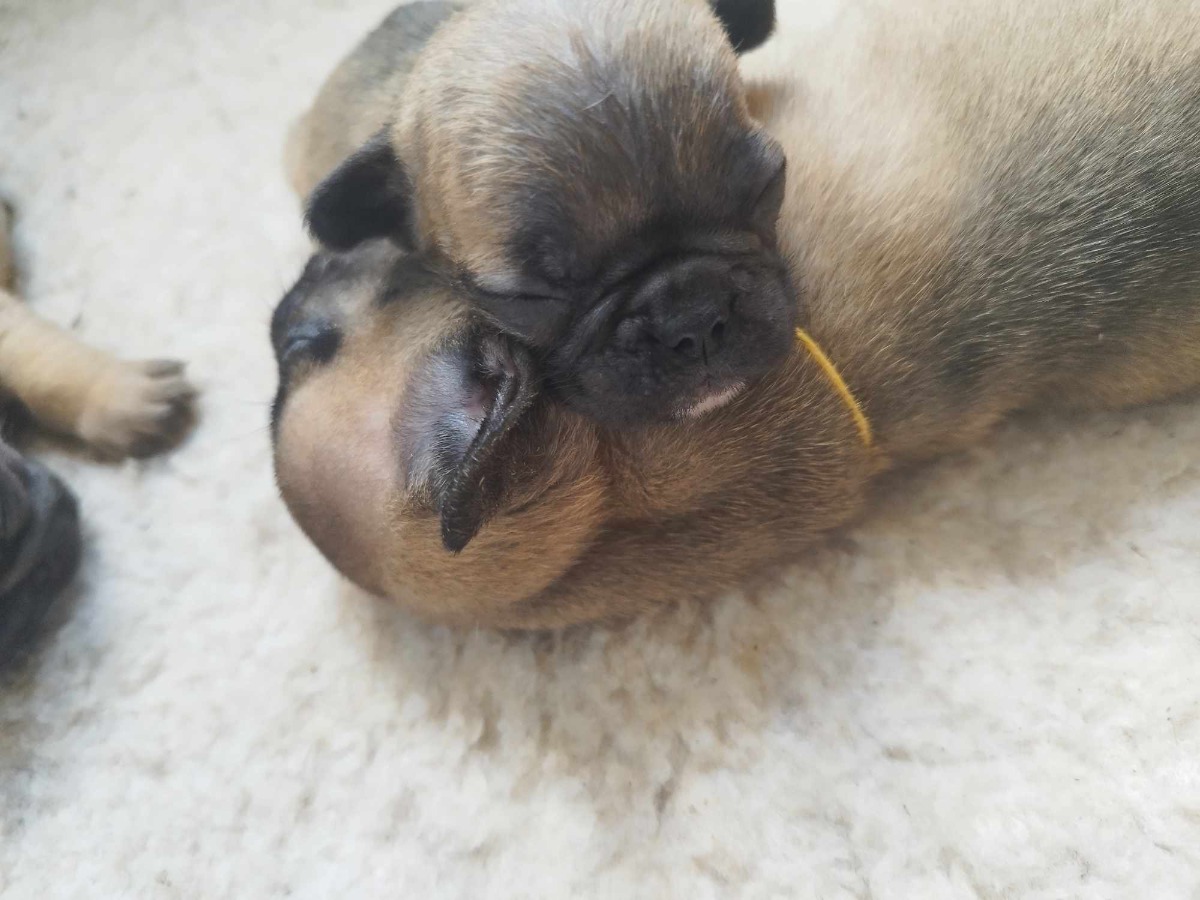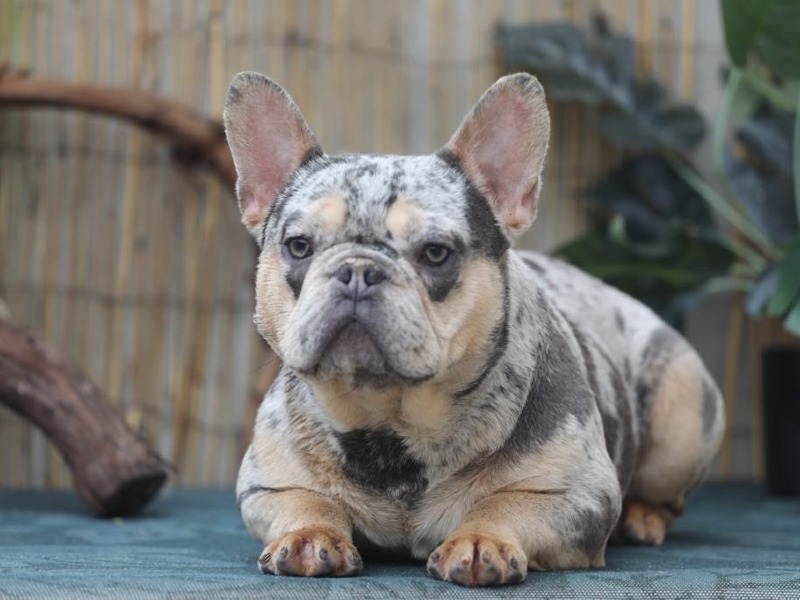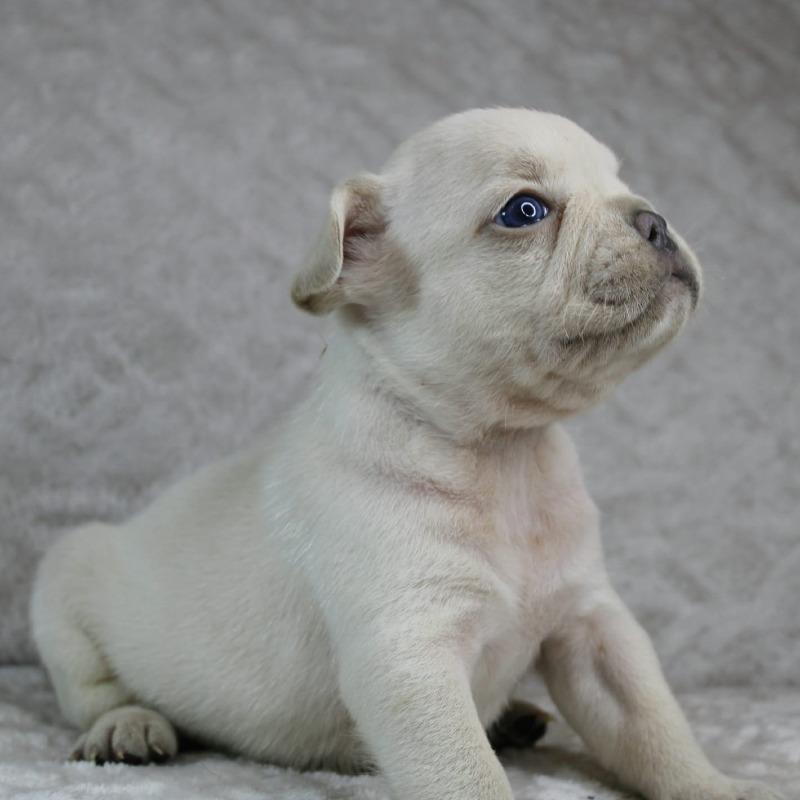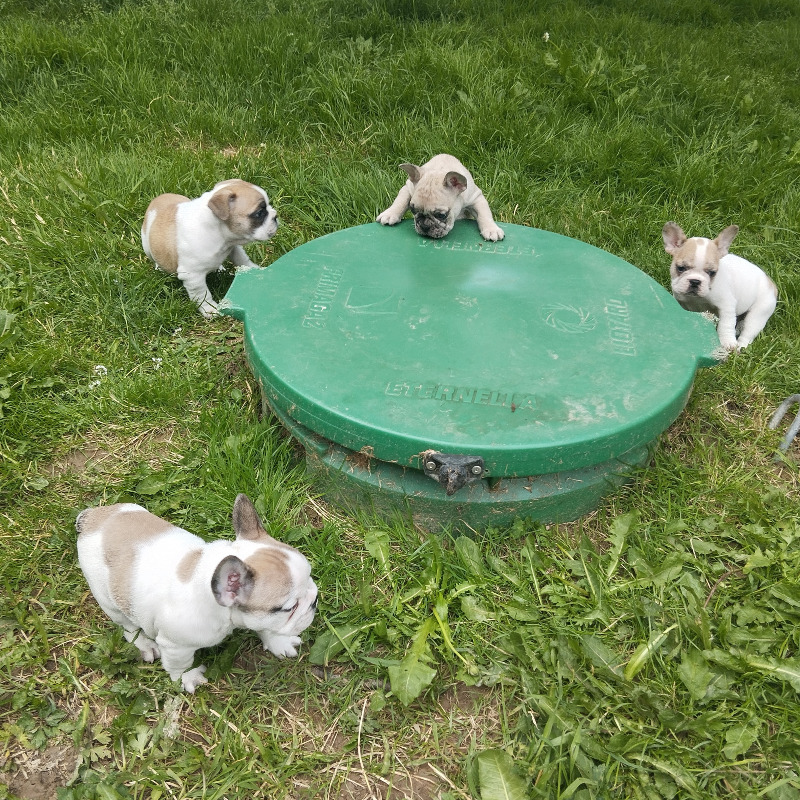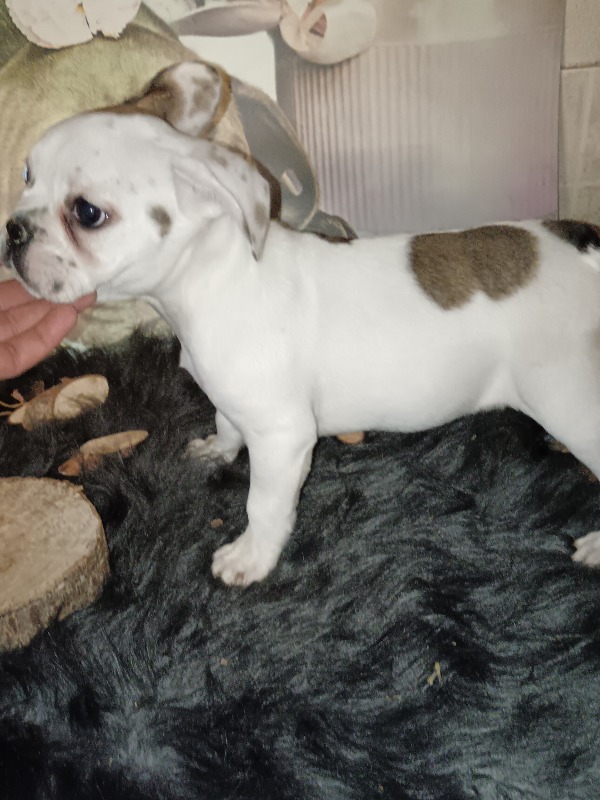French bulldog
Welcome to our page dedicated to the breed of dog french bulldog!
Here, you will find all the useful information about french bulldog. This descriptive profile will allow you to discover the aspects of this breed. You can notably consult information about the average price, monthly and annual upkeep expenses, their health, name ideas, as well as their official recognition by competent authorities.
Explore this page to discover everything you need to know.
Overall description of the breed
Created and developed in France, the exact origins of the French Bulldog remain unclear, it is probably a cross between the English Bulldog, the Toy Bulldog (an ancestor of the English Bulldog), the Doguin and certainly local French dogs. In the past, its ancestors were used as guard and hunting dogs, especially as a ratter to dislodge small vermin in their burrows. In the early 20ᵉ century, he quickly became the chic little muggle of the nobility and bourgeoisie, a far cry from his original role as a butcher's or stable watchdog that he had been assigned in the previous century. Worked and selected discreetly in France until 1980, he made his first appearance in exhibitions at the slaughterhouses of La Villette, it is from this moment that he met a great popular success in Europe and some time later in North America. The French Bulldog was recognised as a breed by the International Cynological Federation on 30 November 1954, and its current standard was published on 3 November 2014.
The French Bulldog is a small dog, stocky, short and compact, with a robust musculature and solid construction, which earns him the nickname of "little hound". He has a good opening of the chest and a pronounced depth of chest, combined with well sprung ribs and a slightly raised belly, which gives him a dynamic appearance. His head is typical of the bull dog, massive and square in shape, his muzzle is short, almost flat, with a clear and almost imperceptible stop. His eyes are round, well proportioned, with a bright and lively look. The Frenchie has the particularity of having two small erect ears on the top of the skull, with rounded tips. The tail is short and naturally pointed, a specific characteristic that makes up the charm of the breed. The coat is short, close, abundant and shiny, covering the whole body except for the belly. The colours of coat allowed by the standard are: red, fawn, black, fawn, brindle and white, other colours outside the standard also exist.
The French Bulldog has a gentle character, pleasant and fusional with its owners, of a jovial and dynamic nature, it is a dog very close to its family, rather sociable with its congeners and the other animals. He has a small character, sometimes stubborn, however, his determined and protective temperament makes him particularly endearing. Calm and curious by nature, the French Bulldog will need a sustained daily activity to find its balance, it will appreciate the moments of play accompanied by its social group, in particular the children, with whom it gets along wonderfully. The French Bulldog has all the qualities to be the ideal companion dog, his character traits are marked, but without excess. The Frenchie should never be fearful or aggressive with strangers, but rather welcoming and cheerful. Closely related to his family, faithful and loyal, this energetic little dog will be the perfect companion to fill your daily life with love and tenderness!
His adult weight will be approximately 17 to 30 lb and his height will be approximately 11" to 13.5".
Awareness of acquiring an animal
Each animal is a sensitive being, deserving love, attention and care.
When you choose to adopt an animal, you take on the responsibility of ensuring its health and well-being throughout its life.
To learn more about animal welfare, we invite you to consult our FAQ by clicking the button below:
Origins
The French Bulldog is a dog breed originating from France, developed in the 19th century. Its ancestors include small English Bulldogs and various terriers. Initially, these dogs accompanied English workers, especially lace makers, during their migration to France following the Industrial Revolution. They were particularly prized for their small size and affectionate nature. Once in France, these dogs were crossed with French terriers, refining the distinctive features of the French Bulldog. The breed quickly gained popularity, becoming the preferred companion dog of Parisian artists, writers, and aristocrats, particularly for their charming appearance and lively personality.
History
The history of the French Bulldog dates back to the 19th century, when English workers migrated to France, bringing with them small bulldogs. Once in France, these dogs were crossed with local terriers, giving birth to the breed we know today. The French Bulldog quickly gained popularity, especially among artists and the Parisian elite. In the early 20th century, it was imported to the United States, where it also met with great success. Today, the French Bulldog is appreciated worldwide for its friendly nature and distinctive appearance, marked by bat-like ears and a unique facial expression.
Standard
The standard of the French Bulldog breed is defined by various international cynological organizations, including the Fédération Cynologique Internationale (FCI). This standard describes a compact, muscular dog with a solid bone structure and a short stature. The head is wide and square, with well-erected bat ears and distinctive facial folds. The eyes are round and expressive, dark in color. The tail is naturally short, often curly or straight. The coat is short, smooth, and shiny. The standard also highlights the balanced proportions of the body, with a height at the withers of 27 to 35 cm and an ideal weight between 8 and 14 kg.
Physical characteristics
The French Bulldog is a small dog, measuring between 27 and 35 cm at the withers and weighing between 8 and 14 kg. It has a short, smooth and shiny coat, easy to maintain. Accepted coat colors include fawn, brindle, white and black, as well as white and brindle. Their head is wide and square with erect ears, often described as bat ears. The muzzle is short, with a nose often black. The eyes are large, round and dark, adding to their unique facial expression. The body is compact and muscular, with a naturally short tail, often curly.
Character
The French Bulldog is known for its affectionate, playful, and loyal nature. It is a dog that loves human company and is often very attached to its family. Despite its small size, it is very vigilant and can be protective towards its loved ones. This dog is also known for its intelligence and ability to adapt to various environments, whether it be an apartment in the city or a house with a garden. It is sociable with other animals and particularly enjoys the company of children, with whom it loves to play.
Life expectancy
The French Bulldog has an average life expectancy of 10 to 12 years. However, with a balanced diet, regular veterinary care, and a healthy environment, some individuals can live longer. Like all dog breeds, longevity also depends on genetic factors and the quality of life provided by the owner. Special attention should be paid to preventing common health problems in this breed, such as respiratory disorders and joint issues, to maximize their life expectancy and ensure a healthy old age.
Exercise and activity needs
The French Bulldog is not a hyperactive breed, but still requires daily exercise to stay healthy. Short daily walks and play sessions are generally enough to meet their activity needs. Due to their short muzzle, they may be sensitive to heat and should avoid intense exercise in hot weather. Indoor games and interactive toys are excellent alternatives to mentally and physically stimulate them. It is also important to socialize them from a young age to prevent any unwanted behavior and promote good integration into various environments.
Recommended diet
The diet of the French bulldog must be balanced and tailored to its specific needs. High quality food, rich in proteins, vitamins and minerals, is recommended. It is important to monitor the quantities to avoid obesity, to which this breed is predisposed. The average monthly cost for feeding a French bulldog ranges from 40 to 70 euros, depending on the quality of the products chosen and the individual needs of the dog. Meals should be divided into two or three daily portions to facilitate digestion and maintain overall good health.
Training and obedience
The French Bulldog is an intelligent and eager to please dog, which makes training easier. However, it can also be stubborn. A positive training approach, based on rewards and positive reinforcement, is recommended. Training sessions should be short and varied to maintain interest. It is important to start training from a young age, focusing on socialization, basic obedience, and good manners at home. Patience and consistency are essential to achieve good results with this breed, which appreciates structure and regular interactions with its owner.
Behavior with children
The French Bulldog is generally very good with children. Its affectionate and playful nature makes it an excellent companion for young families. It is patient and tolerant, allowing it to get along well with children of all ages. However, as with any interaction between dogs and children, it is essential to supervise their interactions to avoid any accidents. Teaching children to respect the dog and not to disturb it while eating or sleeping is crucial. With proper socialization and education, the French Bulldog can become a loyal and protective friend for children.
Compatibility with Other Animals
The French Bulldog is generally sociable and can coexist with other pets if properly socialized from a young age. Its friendly and non-aggressive nature allows it to get along well with other dogs and even with cats. However, each dog is unique, and some precautions should be taken during the first meetings. It is recommended to introduce them gradually and under supervision to avoid any potential conflicts. Good early socialization and repeated positive interactions can help strengthen harmonious relationships between the French Bulldog and other animals in the house.
Grooming needs
The French Bulldog requires regular grooming to maintain its short and shiny coat. Weekly brushing is usually sufficient to remove dead hair and keep its skin healthy. It is important to regularly clean the folds of its skin to prevent irritations and infections. Ears should be checked and cleaned weekly to prevent ear infections. In addition, proper dental hygiene, including brushing teeth and chew toys, is essential to prevent dental problems. French Bulldogs also require occasional baths using a gentle dog shampoo.
Health
The French Bulldog is subject to certain specific health conditions of the breed. Respiratory problems, due to their short muzzle, are common and can be exacerbated by heat or intense exercise. Eye disorders, such as corneal ulcers and cataracts, require regular monitoring. Joint problems, such as hip dysplasia and patellar luxation, are also common. Regular veterinary follow-up is essential to detect and treat these problems early. A balanced diet and controlled weight also help maintain their overall health and prevent some of these conditions.
Average price
The price of a French Bulldog can vary significantly depending on various factors such as the reputation of the breeder, the lineage, and the region. On average, the cost of purchasing a French Bulldog ranges from 1500 to 3000 euros. Puppies from champion bloodlines or with particularly sought-after characteristics can reach higher prices, sometimes up to 5000 euros or more. It is important to choose a reputable breeder to ensure the health and well-being of the puppy. Initial costs also include vaccinations, microchip, and other basic veterinary care.
Expenses
Monthly expenses for a French Bulldog vary depending on several factors, such as nutrition, healthcare, and accessories. On average, monthly costs can be estimated between 50 and 100 euros. Nutrition represents a significant portion of these expenses, followed by veterinary care, including routine visits and possible medical treatments. Grooming fees, though modest, should also be taken into account. Additionally, toys, accessories, and pet insurance can add to monthly expenses. It is important to budget appropriately to ensure the well-being of this companion.
Name ideas
Choosing a name for a French Bulldog can be fun and should reflect their unique personality. Here are some suggestions:
For males: Max, Oscar, Bruno, Charly, Rocky, Gus, Leo, Jack, Milo, Rufus.
For females: Bella, Daisy, Lola, Ruby, Lucy, Zoe, Mia, Nala, Rosie, Stella.
These short and easy to pronounce names are ideal for commands and calls. It is recommended to choose a name that does not sound like common commands to avoid confusion. The name should also match your dog's appearance and character to strengthen the bond with them.
Legislation and regulation
In France, the French Bulldog is not classified as a "dangerous" breed and is therefore not subject to specific restrictions applied to dogs of category 1 and 2. However, like all dogs, it is mandatory to have them identified by microchip or tattoo and to vaccinate them, especially against rabies if traveling abroad. Owners must also comply with local regulations regarding leash dogs and walking areas. It is important to inquire about the laws in force in your country or region to ensure compliance with all legal obligations related to owning a French Bulldog.
Official recognition
The French Bulldog is recognized by several cynological organizations around the world. In France, it is registered in the Livre des Origines Français (LOF), managed by the Société Centrale Canine (SCC). The Fédération Cynologique Internationale (FCI) also recognizes this breed under standard No. 101. In the United States, the French Bulldog is recognized by the American Kennel Club (AKC). In the United Kingdom, it is registered with the Kennel Club (KC). Each organization has specific criteria for registration and recognition of the breed, based on defined standards to ensure the quality and preservation of the breed's characteristics.
Pedigrees
The French Bulldog can obtain a pedigree issued by several recognized breed clubs in different countries. In France, the Société Centrale Canine (SCC) manages the Livre des Origines Français (LOF) and issues pedigrees for purebred dogs. In the United States, the American Kennel Club (AKC) offers detailed pedigrees for registered French Bulldogs. The Kennel Club (KC) in the United Kingdom also issues pedigrees for this breed. In Australia, the Australian National Kennel Council (ANKC) provides pedigrees. These pedigrees certify the dog's ancestry and ensure compliance with breed standards, thus ensuring the quality and purity of the bloodlines.
Destination and usage
The French Bulldog is mainly intended to be a companion dog. Its affectionate, playful, and adaptable nature makes it an excellent companion for families, singles, and elderly people. Although this breed is not known for its working abilities, some French Bulldogs participate in conformation shows and therapy dog activities. Their compact size and sociable nature also make them suitable for apartment living. Due to their moderate exercise needs, they are well-suited for people with a more sedentary lifestyle, while bringing a joyful and loving presence to everyday life.
Prohibitions
The French Bulldog, as a breed, is not subject to any specific restrictions in France. However, it is important to note that some local regulations may restrict access for dogs, including French Bulldogs, to certain public spaces such as beaches, parks, or public transportation. Additionally, due to their sensitivity to extreme temperatures, it is not recommended to expose them to severe weather conditions or leave them unattended in vehicles under the sun. Owners should always inquire about local rules and adopt responsible practices for the well-being of their pet.
Breeders of French bulldog
Want to see more breeders of French bulldog?
Check out the page of our directory listing all breeders of French bulldogClassified Ads of French bulldog
Breed clubs of french bulldog
No of french bulldog breed clubs are currently registered on Preeders.
If you would like to highlight your breed club, sign up for free now and be the first to appear on this page.




